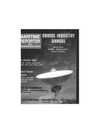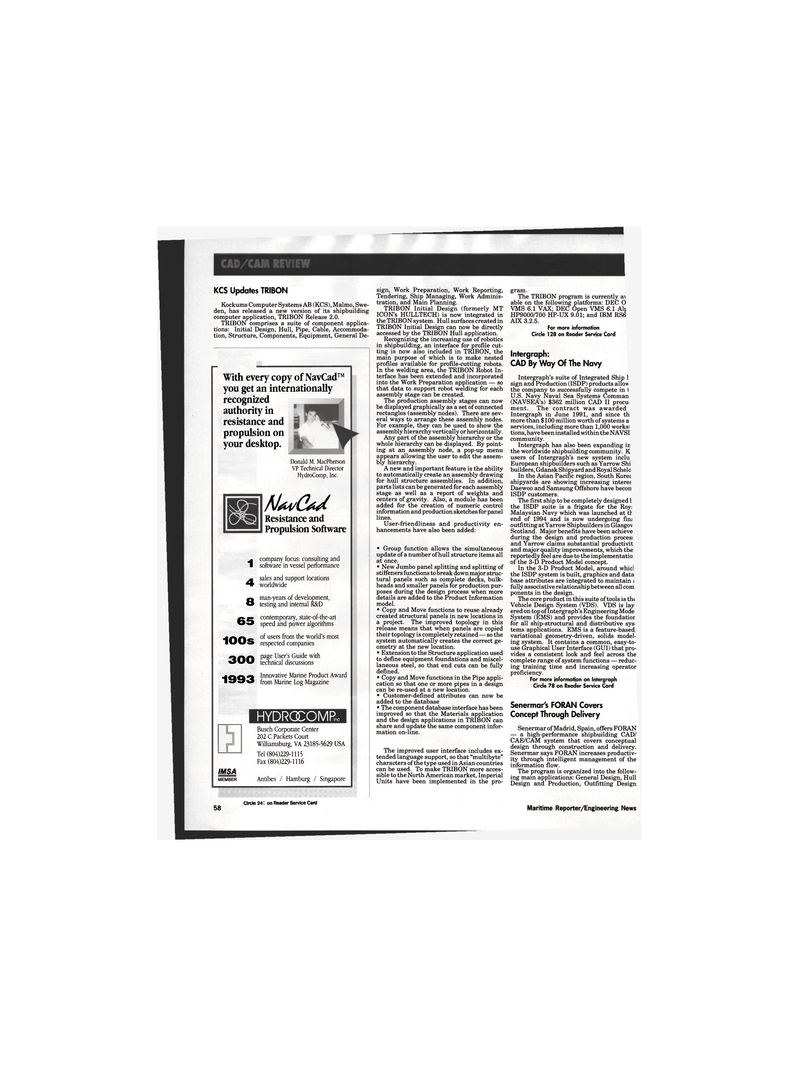
Page 56: of Maritime Reporter Magazine (July 1995)
Read this page in Pdf, Flash or Html5 edition of July 1995 Maritime Reporter Magazine
KCS Updates TRIBON
Kockums Computer Systems AB (KCS), Malmo, Swe- den, has released a new version of its shipbuilding computer application, TRIBON Release 2.0.
TRIBON comprises a suite of component applica- tions: Initial Design, Hull, Pipe, Cable, Accommoda- tion, Structure, Components, Equipment, General De-
With every copy of NavCad™ you get an internationally recognized authority in resistance and propulsion on your desktop.
Donald M. MacPherson
VP Technical Director
HydroComp, Inc.
Nm/CUU
Resistance and
Propulsion Software company focus: consulting and software in vessel performance sales and support locations worldwide man-years of development, testing and internal R&D contemporary, state-of-the-art speed and power algorithms of users from the world's most respected companies page User's Guide with technical discussions
Innovative Marine Product Award from Marine Log Magazine
HYDRQDOMRnc
Busch Corporate Center 202 C Packets Court
Williamsburg, VA 23185-5629 USA
Tel (804)229-1115
Fax (804)229-1116
Antibes / Hamburg / Singapore
Circle 242 on Reader Service Card 58 1 4 8 65 100s 300 1993
IMSA
MEMBER sign, Work Preparation, Work Reporting,
Tendering, Ship Managing, Work Adminis- tration, and Main Planning.
TRIBON Initial Design (formerly MT
ICON'S HULLTECH) is now integrated in the TRIBON system. Hull surfaces created in
TRIBON Initial Design can now be directly accessed by the TRIBON Hull application.
Recognizing the increasing use of robotics in shipbuilding, an interface for profile cut- ting is now also included in TRIBON, the main purpose of which is to make nested profiles available for profile-cutting robots.
In the welding area, the TRIBON Robot In- terface has been extended and incorporated into the Work Preparation application — so that data to support robot welding for each assembly stage can be created.
The production assembly stages can now be displayed graphically as a set of connected rectangles (assembly nodes). There are sev- eral ways to arrange these assembly nodes.
For example, they can be used to show the assembly hierarchy vertically or horizontally.
Any part of the assembly hierarchy or the whole hierarchy can be displayed. By point- ing at an assembly node, a pop-up menu appears allowing the user to edit the assem- bly hierarchy.
A new and important feature is the ability to automatically create an assembly drawing for hull structure assemblies. In addition, parts lists can be generated for each assembly stage as well as a report of weights and centers of gravity. Also, a module has been added for the creation of numeric control information and production sketches for panel lines.
User-friendliness and productivity en- hancements have also been added: • Group function allows the simultaneous update of a number of hull structure items all at once. • New Jumbo panel splitting and splitting of stiffeners functions to break down major struc- tural panels such as complete decks, bulk- heads and smaller panels for production pur- poses during the design process when more details are added to the Product Information model. • Copy and Move functions to reuse already created structural panels in new locations in a project. The improved topology in this release means that when panels are copied their topology is completely retained — so the system automatically creates the correct ge- ometry at the new location. • Extension to the Structure application used to define equipment foundations and miscel- laneous steel, so that end cuts can be fully defined. • Copy and Move functions in the Pipe appli- cation so that one or more pipes in a design can be re-used at a new location. • Customer-defined attributes can now be added to the database • The component database interface has been improved so that the Materials application and the design applications in TRIBON can share and update the same component infor- mation on-line.
The improved user interface includes ex- tended language support, so that "multibyte" characters of the type used in Asian countries can be used. To make TRIBON more acces- sible to the North American market, Imperial
Units have been implemented in the pro- gram.
The TRIBON program is currently a\ able on the following platforms: DEC O
VMS 6.1 VAX; DEC Open VMS 6.1 Alj
HP9000/700 HP-UX 9.01; and IBM RS6
AIX 3.2.5.
For more information
Circle 128 on Reader Service Card
Intergraph:
CAD By Way Of The Navy
Intergraph's suite of Integrated Ship 1 sign and Production (ISDP) products allow the company to successfully compete in 1
U.S. Navy Naval Sea Systems Comman (NAVSEA's) $362 million CAD II procu ment. The contract was awarded
Intergraph in June 1991, and since th more than $100 million worth of systems a services, including more than 1,000 worksi tions, have been installed within the NAVSI community.
Intergraph has also been expanding in the worldwide shipbuilding community. K users of Intergraph's new system inclu
European shipbuilders such as Yarrow Shi builders, Gdansk Shipyard and Royal Schelc
In the Asian Pacific region, South Korej shipyards are showing increasing interes
Daewoo and Samsung Offshore have becon
ISDP customers.
The first ship to be completely designed t the ISDP suite is a frigate for the Roy:
Malaysian Navy which was launched at tl end of 1994 and is now undergoing fin; outfitting at Yarrow Shipbuilders in Glasgov
Scotland. Major benefits have been achieve during the design and production proces! and Yarrow claims substantial productivit and major quality improvements, which the reportedly feel are due to the implementatio: of the 3-D Product Model concept.
In the 3-D Product Model, around whicl the ISDP system is built, graphics and data base attributes are integrated to maintain i fully associative relationship between all com ponents in the design.
The core product in this suite of tools is th(
Vehicle Design System (VDS). VDS is lay ered on top of Intergraph's Engineering Mode
System (EMS) and provides the foundatior for all ship-structural and distributive sys- tems applications. EMS is a feature-based, variational geometry-driven, solids model- ing system. It contains a common, easy-to- use Graphical User Interface (GUI) that pro- vides a consistent look and feel across the complete range of system functions — reduc- ing training time and increasing operator proficiency.
For more information on Intergraph
Circle 78 on Reader Service Card
Senermar's FORAN Covers
Concept Through Delivery
Senermar of Madrid, Spain, offers FORAN — a high-performance shipbuilding CAD/
CAE/CAM system that covers conceptual design through construction and delivery.
Senermar says FORAN increases productiv- ity through intelligent management of the information flow.
The program is organized into the follow- ing main applications: General Design, Hull
Design and Production, Outfitting Design
Maritime Reporter/Engineering News

 55
55

 57
57
